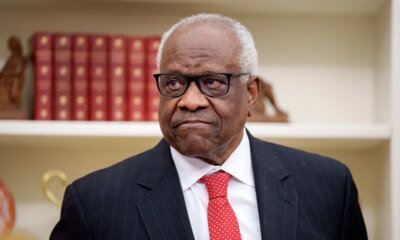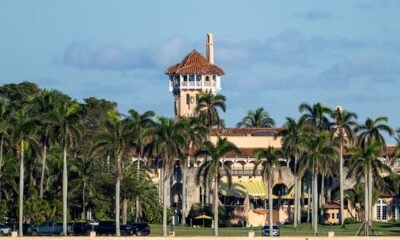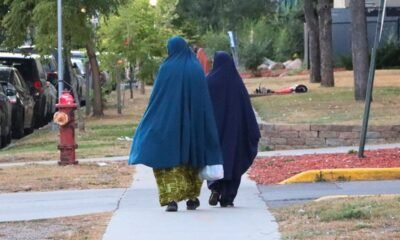INTERNACIONAL
Supreme Court to debate Trump restrictions on birthright citizenship and enforcement of nationwide injunctions
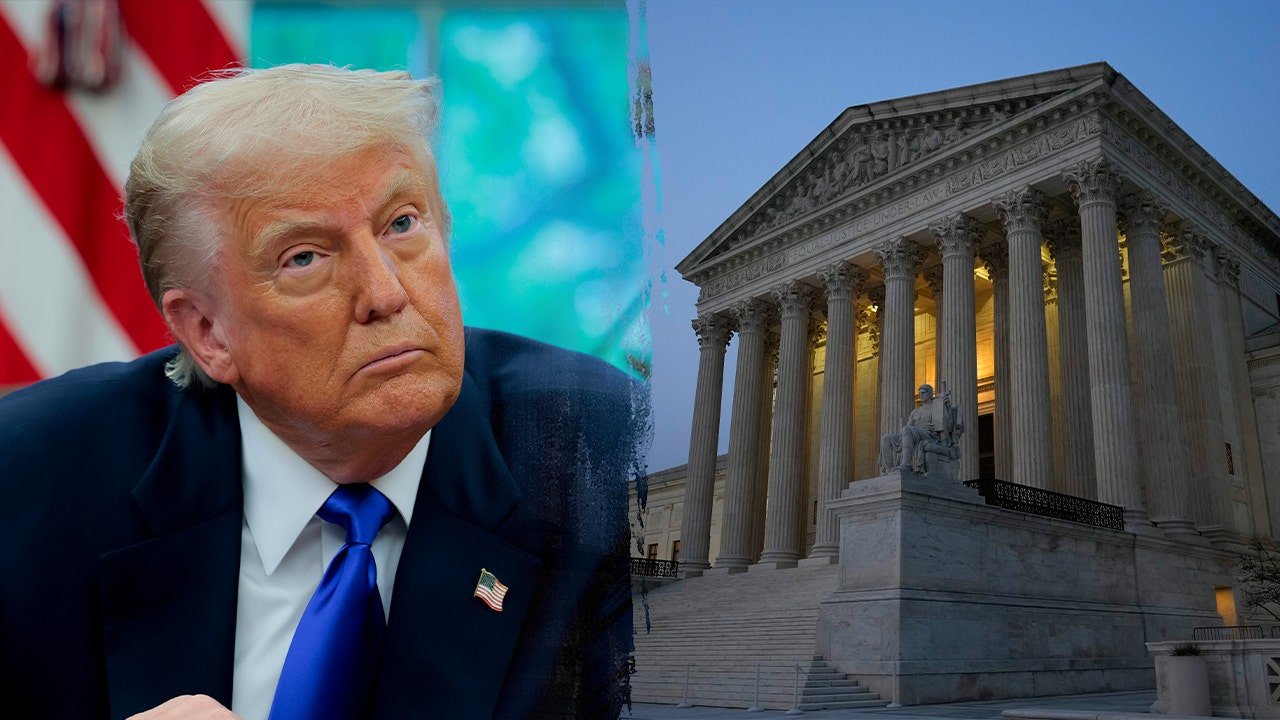
The case on the Supreme Court’s docket this week ostensibly deals with a challenge to the Trump administration’s efforts to narrow the definition of birthright citizenship.
But overriding that important constitutional debate is a more immediate and potentially far-reaching test of judicial power: the ability of individual federal judges to issue universal or nationwide injunctions, preventing temporary enforcement of President Donald Trump’s sweeping executive actions.
That will be the focus when the nine justices hear oral arguments Thursday morning about how President Trump’s restrictions on who can be called an American citizen can proceed in the lower federal courts.
Trump signed the executive order on his first day back in office that would end automatic citizenship for children of people in the U.S. illegally.
SUPREME COURT POISED TO MAKE MAJOR DECISION THAT COULD SET LIMITS ON THE POWER OF DISTRICT JUDGES
In addressing the Trump administration’s birthright citizenship case, the Supreme Court will also be posed a much broader question concerning the injunction power of federal judges. (Getty Images)
Separate coalitions of about two dozen states, along with immigrant rights groups, and private individuals — including several pregnant women in Maryland — have sued.
Three separate federal judges subsequently issued orders temporarily blocking enforcement across the country while the issues are fully litigated in court. Appeals courts have declined to disturb those rulings.
Now the three consolidated cases come to the high court in an unusual scenario, a rare May oral argument that has been fast-tracked for an expected ruling in coming days or weeks.
The executive order remains on hold nationwide until the justices decide.
But the cases will likely not be decided on the merits at this stage, only on whether to narrow the scope of those injunctions. That would allow the policy to take effect in limited parts of the country or only to those plaintiffs actually suing over the president’s authority.
SUPREME COURT TO HEAR ORAL ARGUMENTS IN BIRTHRIGHT CITIZENSHIP CASE
A high court decision could be sweeping, setting a precedent that would affect the more than 310 — and counting — federal lawsuits against White House actions filed since Jan. 20, according to a Fox News data analysis.
Of those, more than 200 judicial orders have halted large parts of the president’s agenda from being enacted, almost 40 of them nationwide injunctions. Dozens of other cases have seen no legal action so far on gateway issues like temporary enforcement.
While the Supreme Court has never ruled directly on the use of universal injunctions, several conservative justices have expressed concerns over power.
Justice Clarence Thomas in 2018 labeled them «legally and historically dubious,» adding, «These injunctions are beginning to take a toll on the federal court system – preventing legal questions from percolating through the federal courts, encouraging forum shopping, and making every case a national emergency for the courts and for the Executive Branch.»
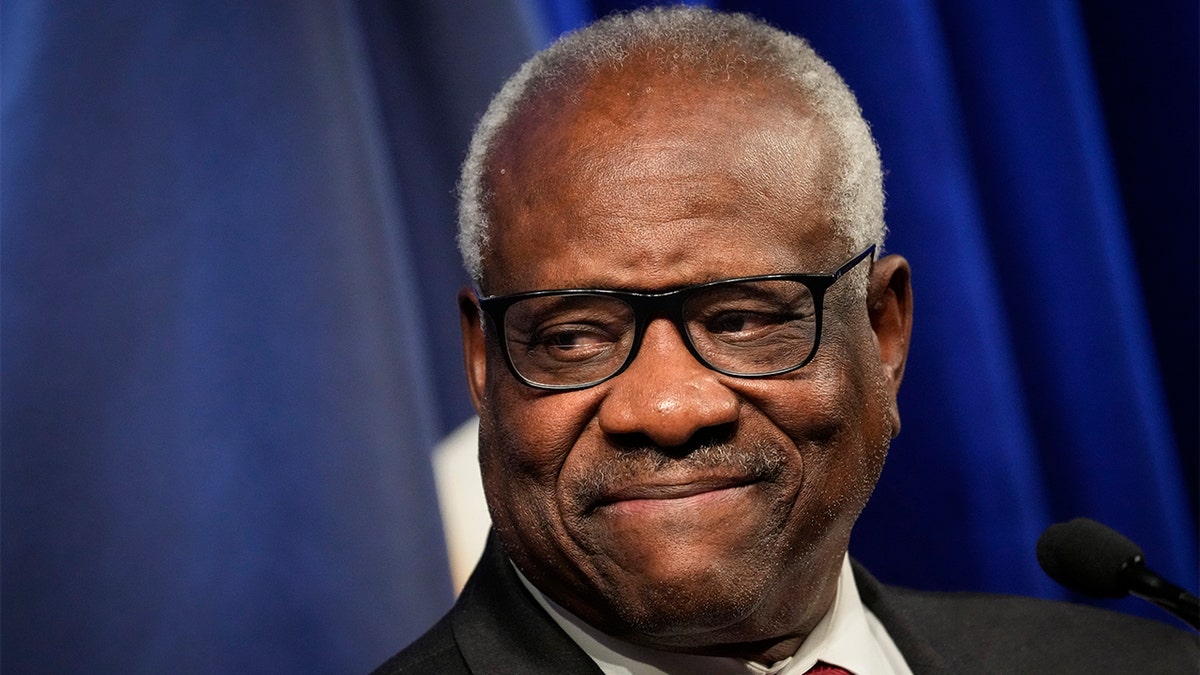
Justice Clarence Thomas has called universal injunctions «legally and historically dubious.» (Drew Angerer/Getty Images)
Emergency docket and politics of the moment
And it comes to the Supreme Court as part of the so-called emergency or «shadow» docket, time-sensitive appeals known officially as «applications» that usually arrive in the early stages.
They seek to temporarily block or delay a lower court or government action that, despite its procedurally narrow posture, can have immediate and far-reaching implications.
Things like requests for stays of execution, voting restrictions, COVID vaccine mandates or access to a federally approved abortion medication and, since January, Trump’s sweeping executive reform plans.
Some members of the court have expressed concern that these kinds of appeals are arriving with greater frequency in recent years, high-profile issues leading to rushed decisions without the benefit of full briefing or deliberation.
‘ACTIVIST’ JUDGES KEEP TRYING TO CURB TRUMP’S AGENDA – HERE’S HOW HE COULD PUSH BACK
Justice Elena Kagan last year said the shadow docket’s caseload has been «relentless,» adding, «We’ve gotten into a pattern where we’re doing too many of them.»
The pace this term has only increased with the new administration frustrated at dozens of lower court setbacks.
«We’ve seen a lot of justices critical of the fact that the court is taking an increasing number of cases and deciding them using the shadow docket,» said Thomas Dupree, a former top Justice Department lawyer and a top appellate advocate.
«These justices say, ‘Look, we don’t have to decide this on an emergency basis. We can wait.’»
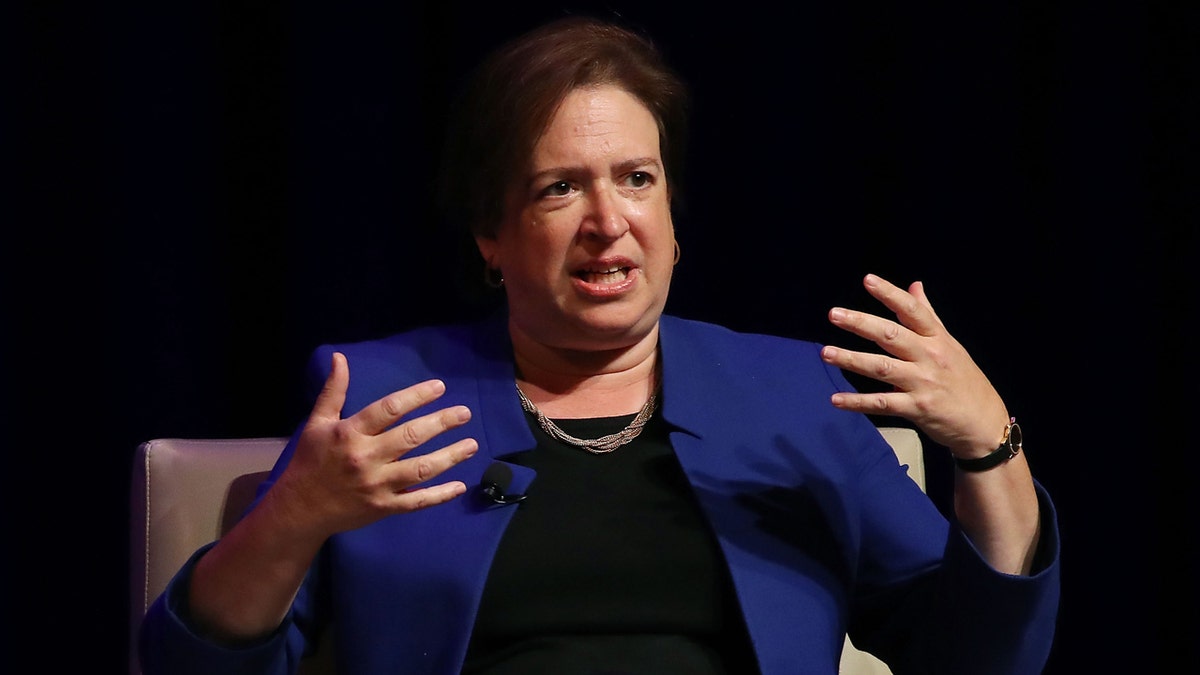
The Supreme Court’s «shadow» docket caseload is «relentless,» according to Justice Elena Kagan. (Mark Wilson/Getty Images)
Many progressive lawyers complain the Trump administration has been too eager to bypass the normal district and intermediate appellate court process, seeking quick, end-around Supreme Court review on consequential questions of law only when it loses.
The debate over birthright citizenship and injunctions is expected to expose further ideological divides on the court’s 6-3 conservative majority.
That is especially true when it comes to the 13 challenges over Trump policies that have reached the justices so far, with six of them awaiting a ruling.
The court’s three more liberal justices have pushed back at several preliminary victories for the administration, including its ban on transgender individuals serving in the military and the use of the Alien Enemies Act to deport scores of illegal immigrants suspected of criminal gang activity in the U.S.
TRUMP’S REMARKS COULD COME BACK TO BITE HIM IN ABREGO GARCIA DEPORTATION BATTLE
Dissenting in one such emergency appeal over the deportations to El Salvador, Justice Sonia Sotomayor wrote, «The Government’s conduct in this litigation poses an extraordinary threat to the rule of law.»
«Our job is to stand up for people who can’t do it themselves. And our job is to be the champion of lost causes,» Sotomayor separately told an American Bar Association audience last week. «But, right now, we can’t lose the battles we are facing. And we need trained and passionate and committed lawyers to fight this fight.»
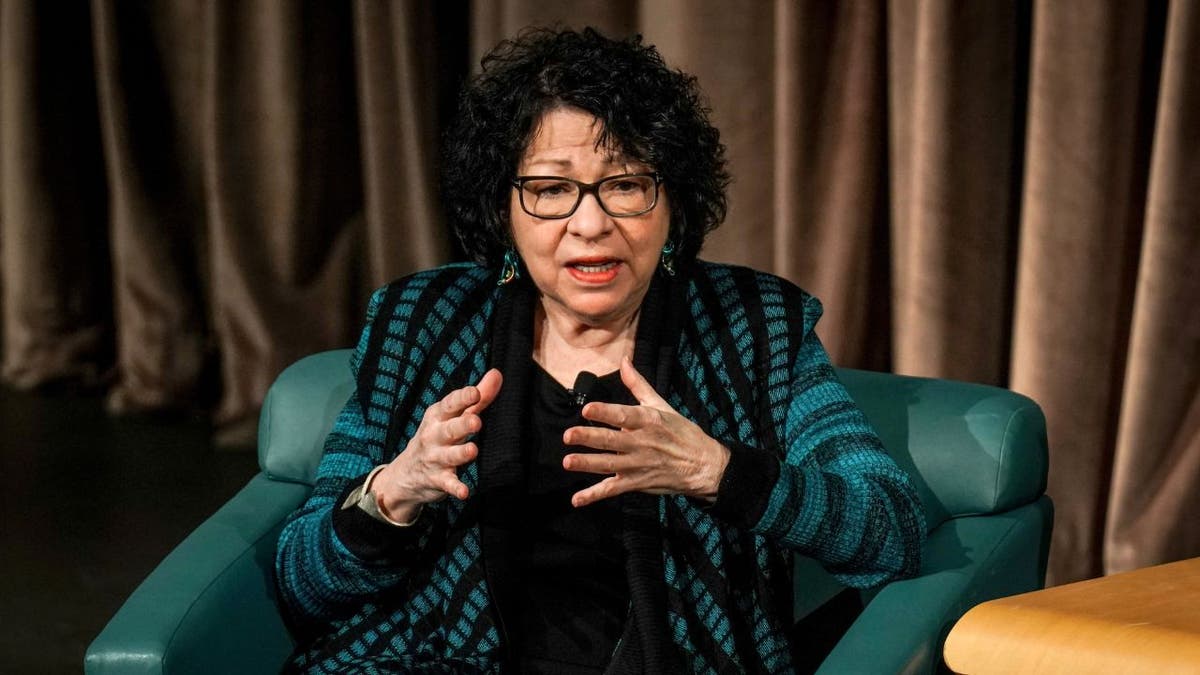
Justice Sonia Sotomayor (Jahi Chikwendiu/The Washington Post via Getty Images)
Trump has made no secret of his disdain for judges who have ruled against his policies or at least blocked them from being immediately implemented.
He called for the formal removal of one federal judge after an adverse decision over deporting illegal immigrants. That prompted Chief Justice John Roberts to issue a rare public statement, saying, «Impeachment is not an appropriate response to disagreement concerning a judicial decision.»
And in separate remarks last week, the chief justice underscored the judiciary’s duty to «check the excesses of Congress or the executive.»
The arguments
The first section of the 14th Amendment to the U.S. Constitution states, «All persons born or naturalized in the United States, and subject to the jurisdiction thereof, are citizens of the United States and of the State wherein they reside.»
Trump said last month he was «so happy» the Supreme Court will hear arguments, adding, «I think the case has been so misunderstood.»
The president said the 14th Amendment, granting automatic citizenship to people born in the U.S., was ratified right after the Civil War, which he interpreted as «all about slavery.»
«If you look at it that way, we would win that case,» the president said in Oval Office remarks.
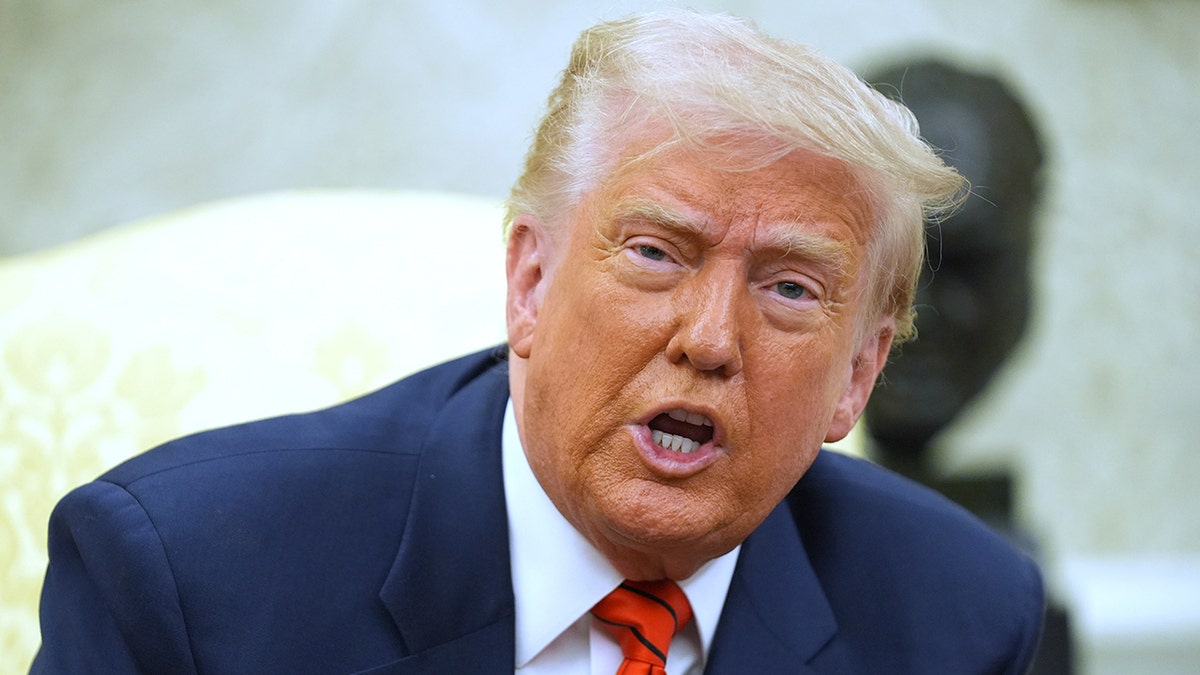
President Donald Trump has cited the 14th Amendment as being «all about» slaves freed around the time of its ratification and believes a birthright citizenship case viewed from that angle can be won. (AP Photo/Evan Vucci)
Executive Order 14160, «Protecting the Meaning and Value of American Citizenship,» would deny it to those born after Feb. 19 whose parents are illegal immigrants. And it bans federal agencies from issuing or accepting documents recognizing citizenship for those children.
An estimated 4.4 million American-born children under 18 are living with an unauthorized immigrant parent, according to the Pew Research Center. There are approximately 11 million undocumented immigrants living in the country, 3.3% of the population. Although some census experts suggest those numbers may be higher.
But in its legal brief filed with the high court, the Justice Department argues the issue now is really about judges blocking enforcement of the president’s policies while the cases weave their way through the courts, a process that could last months or even years. The government initially framed its high court appeal as a «modest request.»
CHIEF JUSTICE ROBERTS ADDRESSES DIVISIONS BETWEEN JUSTICES AFTER SEVERAL RECENT SCOTUS SKIRMISHES
«These injunctions exceed the district courts’ authority under Article III [of the Constitution] and gravely encroach on the President’s executive power under Article II,» said Solicitor General John Sauer, who will argue the administration’s case Thursday. «Until this Court decides whether nationwide injunctions are permissible, a carefully selected subset of district courts will persist in granting them as a matter of course, relying on malleable eye-of-the-beholder criteria.»
The plaintiffs counter the government is misguided in what it calls «citizenship stripping» and the use of nationwide injunctions.
CLICK HERE TO GET THE FOX NEWS APP
«Being directed to follow the law as it has been universally understood for over 125 years is not an emergency warranting the extraordinary remedy of a stay,» said Nicholas Brown, the attorney general of Washington state. «If this Court steps in when the applicant [government] is so plainly wrong on the law, there will be no end to stay applications and claims of emergency, undermining the proper role and stature of this Court. This Court should deny the applications.»
The consolidated cases are Trump v. CASA (24a884); Trump v. State of Washington (24a885); Trump v. New Jersey (24a886).
Supreme Court,Federal Judges,Donald Trump,Immigration,Immigrant Rights,Naturalization,Constitution
INTERNACIONAL
Delayed justice: Argentina’s secret Nazi files expose costly inaction in pursuit of war criminals

NEWYou can now listen to Fox News articles!
Argentina’s cache of declassified files tracking Nazi criminals who fled to South America after World War II offers new insight into how the country handled war criminals living or suspected to be there, including Adolf Eichmann and Walter Kutschmann.
They show Argentina’s shifting attitude toward Nazi criminals — from sluggish responses to efforts to prevent foreign intelligence operations on its soil, such as the 1960 Mossad abduction of Adolf Eichmann to how others were never caught, vanished or died without ever facing justice.
Walter Kutschmann
Kutschmann was an SS and Gestapo officer based in the Lviv (Lwów) region of Poland. He played a direct role in the killings of more than 1,500 Polish Jews, intellectuals and civilians. He is also implicated in the mass murders carried out by the Einsatzgruppen in regions that are now part of Ukraine.
ARGENTINA’S BUNGLED HUNT FOR HITLER’S RIGHT-HAND MAN MARTIN BORMANN REVEALED IN DECLASSIFIED FILES
Walter Kutschmann is pictured during World War II when he was a lieutenant in the German SS in Poland. Kutschmann later escaped to Argentina under the cover as a monk. (Associated Press)
Witness accounts describe Kutschmann publicly shooting an 18-year-old Jewish maid in the head after accusing her of transmitting a venereal disease after allegedly raping her.
The published Argentine files reveal a detailed paper trail of intelligence gathering, diplomatic communications and survivor advocacy surrounding Kutschmann, who entered Argentina pretending to be a monk and lived in the country openly for decades under the alias Pedro Ricardo Olmo. He eventually became a naturalized Argentinian citizen under his false name.
A large portion of the dossier focuses on communications from 1975 when survivor groups and foreign authorities intensified efforts to locate Nazi fugitives. A telegram sent in July 1975, from Jewish survivor organizations, warned officials, including Argentina’s then-president, Isabel de Perón, that Kutschmann was living in the country and was wanted by West German judicial authorities.
The message emphasized that survivors viewed his continued freedom as deeply troubling, especially given Argentina’s reputation as a refuge for many displaced persons after the war. The telegram made specific and public allegations that he entered Argentina under a false identity and had concealed his Nazi past when obtaining citizenship. Given Argentina’s sensitivities after several embarrassing cases were publicized, it appeared to have troubled authorities, who feared further poor publicity over its lax policing standards.
The telegram sent to Argentina’s minister of the interior from the president of the Jewish Association of the Survivors of Nazi Persecution in July 1975, noted in part that the association wanted to «inform him that residing in Argentina for many years is the naturalized Argentine citizen Pedro Ricardo Olmo y Olmos, alias the Nazi criminal Walter Kutschmann, former second lieutenant of the Hitlerite SS security troops, who is wanted by the judicial authorities of the Federal Republic of Germany.»
CREDIT SUISSE INVESTIGATION REVEALS 890 NAZI REGIME ACCOUNTS, SEN GRASSLEY SAYS
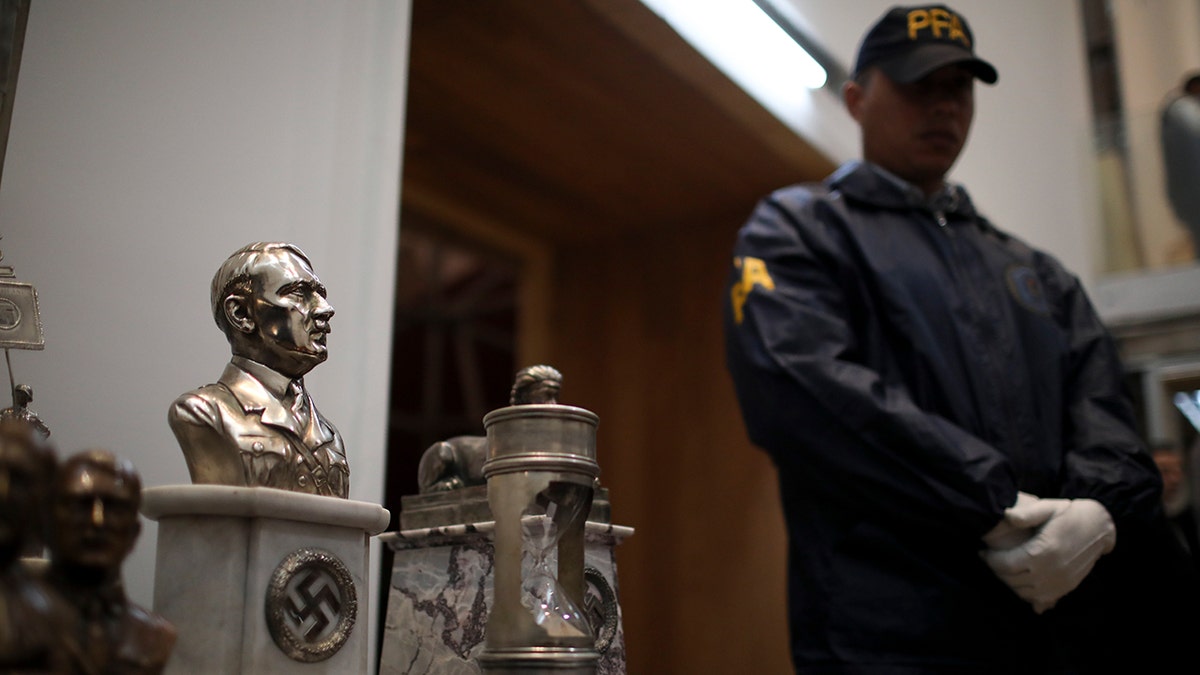
A police officer stands in front of a cache of Nazi artifacts discovered in 2017, during a press conference in Buenos Aires, Argentina, Oct. 2, 2019. Argentine authorities found the cache in the course of a wider investigation into artwork of suspicious origin found at a gallery in Buenos Aires. (Natacha Pisarenko/AP Photo)
It continued, «For us, survivors of the Nazi massacre who have managed to save ourselves and reach this generous land, it causes anguish that a Nazi criminal can move freely in our country.»
The telegram sent from José Moskovits added, «We respectfully request that the Minister adopt the necessary measures in the case against the said Kutschmann, who entered the country under a false name and committed perjury in obtaining Argentine citizenship, concealing his extremely serious background.»
Following the new revelations, surveillance of Kutschmann received more attention from the authorities.
Multiple documents marked «Strictly Confidential» and «Very Urgent» show Argentina’s sense of urgency and discretion, including memoranda and requests from the Department of Registration and Reports in July 1975 seeking expedited background checks on «Pedro Ricardo Olmo/Walter Kutschmann.»
File records reported «no prior criminal or intelligence record» for Olmo, highlighting the difficulty authorities faced linking his Argentine identity to his wartime history. Radiograms and foreign intelligence translations included in the file indicate coordination with Interpol and West German intelligence agencies, including potential extradition issues and attempts to confirm whether the individual living in Argentina was the same person wanted in Europe.
Still, similarly to other botched cases, such as the search for Josef Mengele or Martin Bormann, authorities at times relied heavily on press clippings instead of carrying out more proactive investigations.
SIGN UP FOR ANTISEMITISM EXPOSED NEWSLETTER
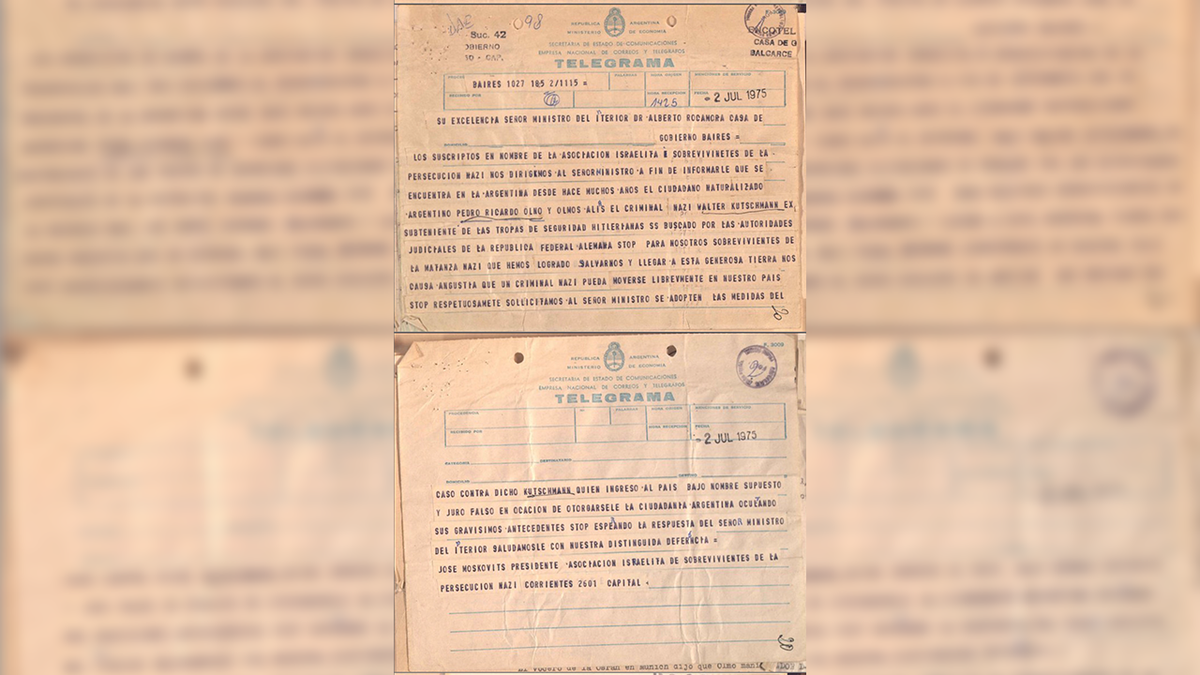
Official July 2, 1975, telegram from the Association of Survivors of Nazi Persecution to Argentina’s interior minister, warning that SS officer Walter Kutschmann was living in the country under a false identity and requesting action. (General Archives of the Government of Argentina)
As public interest grew, Gente magazine, exploited a 1975 lead on Kutschmann, leading to a brief interaction and photographs of him (and of his Argentine wife, Geralda Baeumler, a veterinarian of German origins, later accused by animal welfare organizations of experimenting on and euthanizing dogs in gas chambers) in Miramar, a town in the south of Buenos Aires province.
HOW NAZI WAR CRIMINAL JOSEF MENGELE EVADED CAPTURE IN LATIN AMERICA, REVEALED IN DECLASSIFIED FILES
Multiple exchanges with Interpol establish that Olmo and Kutschmann were, in fact, the same person, leading to an Interpol arrest warrant and a West German extradition request. However, the public noise spooked Kutschmann, who managed to evade capture for another decade. During this time, the Argentine documents show a reversal to the old paper-trail, press-clipping reaction and red-tape.
Throughout a 10-year period, authorities received further information about Kutschmann’s whereabouts from both private and public sources, including renowned Nazi-hunter Simon Wiesenthal and the Anti-Defamation League, among others. A second extradition request in 1985 ultimately led to Kutschmann’s arrest in the Greater Buenos Aires region.
Kutschmann could have been the first Nazi fugitive handed over for international justice by Argentina. However, while his extradition case was being examined, he remained interned in a local hospital due to his ill-health, and in 1986, died of a heart attack before being handed to West Germany for trial and prosecution.

A typed Argentine Interior Ministry document from Aug. 31, 1986, reporting the death of Pedro Ricardo Olmos, also known as Walter Kutschmann, at Juan A. Fernández Municipal Hospital and noting morgue intake and case details. (General Archives of the Government of Argentina)
Adolf Eichmann
Eichmann was a senior Nazi official and described by The United States Holocaust Memorial Museum as «one of the most pivotal actors in the implementation of the ‘Final Solution.’» He oversaw mass deportations and the structuring of death and concentration camps, turning the genocide of Jews into an industrialized process without parallel in history.
ARGENTINA REVEALS SECRET WWII FILES ON HITLER’S HENCHMEN WHO FLED BEFORE, AFTER THE WAR
After the war, Eichmann escaped to Argentina using ratlines and a false identity. He established himself north of Buenos Aires under the alias Ricardo Klement and lived in a ranch with his family, who kept using the Eichmann surname. He also worked for various German companies, including Mercedes-Benz, and was helped by other German nationals who either knew his true identity or were Nazi sympathizers.

Photo of an identity card issued to Adolf Eichmann, Nazi war criminal, born in Solingen, Germany. He became a member of the SS in 1932, and an organizer of antisemitic activities. Captured by U.S. forces in 1945, he escaped from prison some months later, having kept his identity hidden, and in 1950 reached Argentina. He was traced by Israeli agents and taken to Israel in 1960. (Getty Images)
The declassified files show intelligence agencies were unofficially aware of his location since the early 1950s, contradicting later claims that local authorities only learned about his presence after his abduction by the Mossad in 1960.
Most of the dossier on Eichmann relies on indirect witnesses who had heard of people talking about him rather than speaking directly to him.
In 1960, in a daring operation carried out by Israel’s Mossad, agents secretively abducted Eichmann from Argentine soil and flew him to stand trial in Jerusalem, where he was ultimately sentenced to death in 1961 after being found guilty of war crimes and crimes against humanity. He was executed in 1962. His body was cremated, and the remains were scattered in the sea outside Israeli territorial waters.
The declassified files and press reports suggest the Argentine president at the time, Arturo Frondizi, was enraged and embarrassed by what he deemed a violation of Argentina’s sovereignty by Israel. The country protested Israel’s actions at the United Nations and severed diplomatic relations with the Jewish state.
Extensive inquiries in the dossier seek to clarify how Israeli intelligence could have carried out such an operation in Argentina without being detected. The files reveal internal fractures in Argentine security, mostly due to extreme bureaucracy and a lack of communication between agencies even including the office of the president.
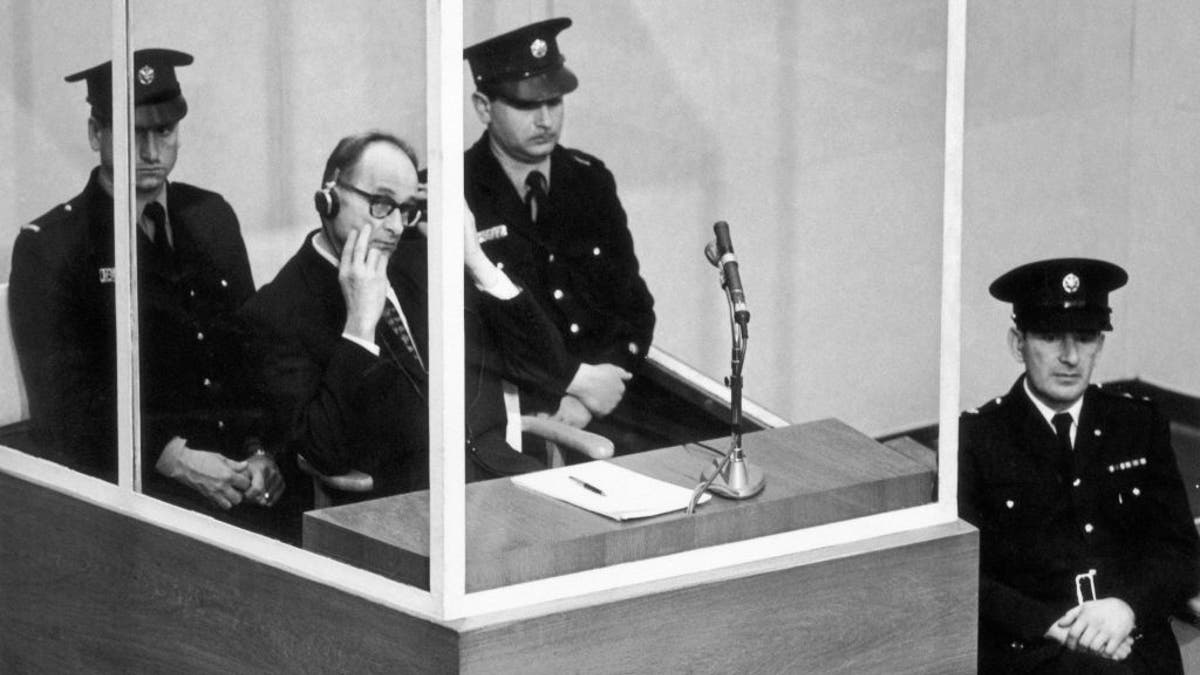
Adolf Eichmann, in a bullet-proof cabin, puts on earphones to hear the reading of the act of accusation against him, Dec. 17, 1961. He was in charge of the extermination of Jews in Poland and then organized the deportation and extermination of Jews in 13 European countries. (Keystone-France/Gamma-Keystone via Getty Images)
CLICK HERE TO DOWNLOAD THE FOX NEWS APP
The files show the case served to establish a new internal security doctrine that avoided public scandal, prevented unilateral operation of foreign agencies in the country and retained tight control of immigration records.
The embarrassment of the Eichmann affair lasted well into the late 1970s, with agencies constantly clipping press articles about how the country was being depicted abroad. It also shaped how Argentina would later handle the case of other Nazi criminals.
anti semitism,holocaust,world war two,israel,south america
INTERNACIONAL
Ucrania: personas ordinarias que hacen cosas extraordinarias
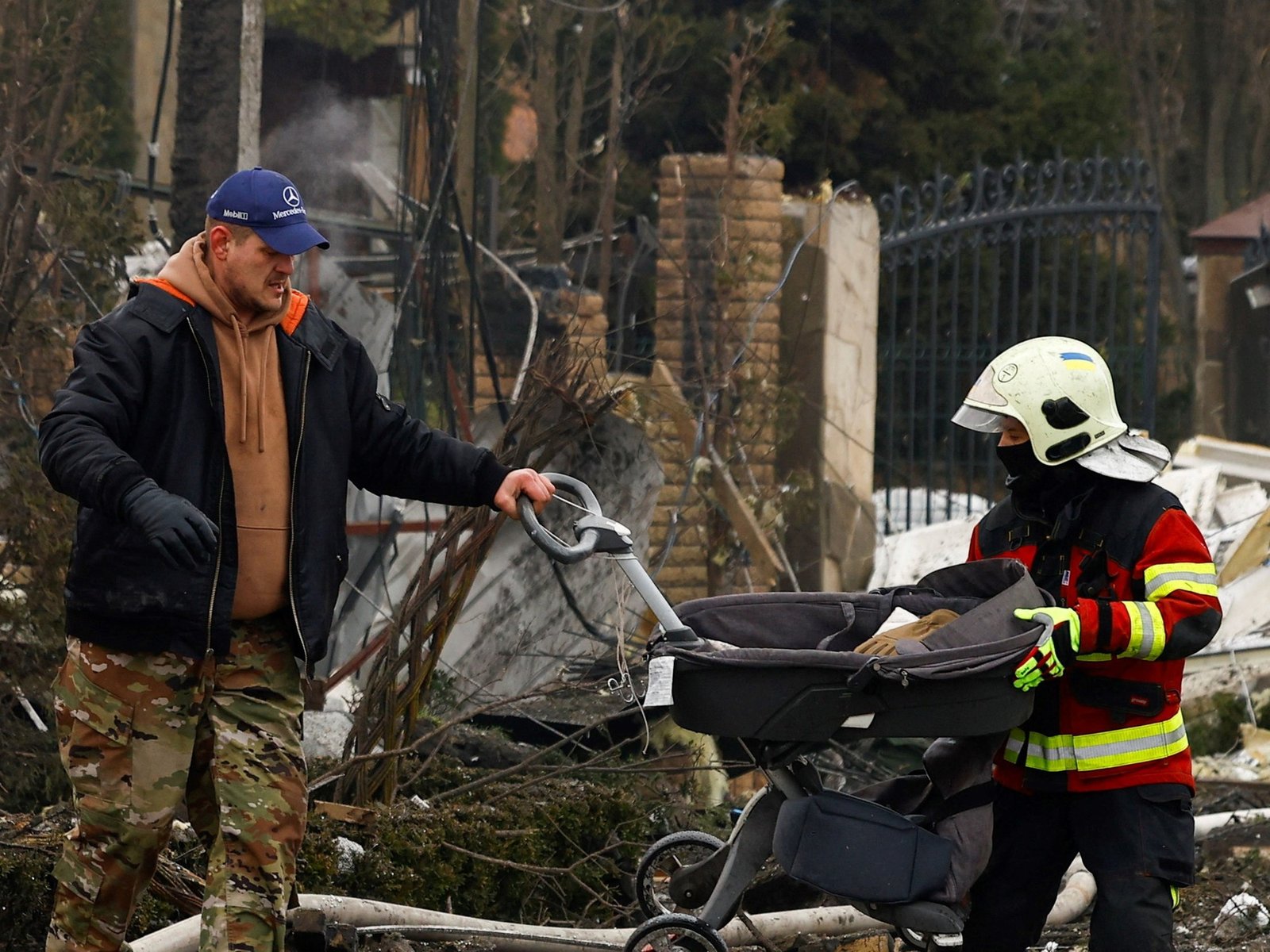
Es el cuarto invierno de la invasión a gran escala. Y es muy difícil. Los misiles y drones rusos destruyen deliberadamente la infraestructura energética de la cual depende la supervivencia de la población civil. En enero y febrero, la temperatura desciende hasta menos veinticinco grados centígrados. Las ciudades ucranianas literalmente se congelan. Millones de personas tienen acceso limitado, o no tienen acceso en absoluto, a la calefacción, el agua y la electricidad.
Recuerdo que en 2022, cuando los rusos empezaron por primera vez a golpear la infraestructura, apareció en las redes una foto de una maestra de Kyiv. Está con un abrigo rojo, un gorro caliente, en cuclillas junto a un poste metálico sobre el que puso su computador, justo en la calle, cerca de una tienda donde funciona un generador y hay señal de internet. Y allí, en pleno frío, les da una clase a los niños. Y pensé que los rusos habían venido a quitarnos todo: nuestra tierra, nuestra libertad, nuestro futuro, la educación de nuestros hijos. Pero esa maestra de Kyiv decidió no entregarles nada. Y hasta una cosa tan sencilla como darles clase a los niños se convirtió en un acto de resistencia.
Sé por experiencia propia que, cuando no puedes confiar en el sistema internacional de paz y seguridad, siempre puedes confiar en las personas. Estamos acostumbrados a pensar en categorías de Estados y organizaciones intergubernamentales, pero la gente común tiene mucha más fuerza de la que ella misma imagina.
Hace cuatro años estaba en Kyiv cuando las tropas rusas intentaban cercarla. En aquel momento, nadie creía que pudiéramos resistir una amenaza militar tan poderosa. Recibíamos cada mañana como una victoria, porque habíamos logrado aguantar una noche más. Recuerdo cómo las organizaciones humanitarias internacionales evacuaban a su personal. Pero la gente común se quedó y empezó a resistir. Las personas comunes empezaron a hacer cosas extraordinarias.
Una de esas personas era mi amiga Victoria Amelina, la escritora ucraniana. En los primeros días de la invasión a gran escala, interrumpió un viaje y regresó a Ucrania. Muy pronto se incorporó al trabajo de documentación de crímenes de guerra. Y además hacía muchas cosas en paralelo. Recuerdo que le decía: haces demasiado y ya estás al borde del agotamiento: escribes un libro, documentas crímenes de guerra, vas a misiones de campo, haces trabajo voluntario. ¿Cómo puedes asumir más proyectos? Pero ella respondía que tenía una sensación persistente de no estar haciendo lo suficiente. Y que no sabía cuánto tiempo le quedaba a ella y, al final, a todos nosotros.
Un mes después de esa conversación, un misil ruso impactó un restaurante en Kramatorsk. En ese momento Vika estaba allí acompañando al Donbas a un grupo de colombianos que promueven la campaña de solidaridad ¡Aguanta Ucrania!. Sufrió una herida grave y cayó en coma. Tal vez suene absurdo, pero le escribía mensajes todos los días. Estaba convencida de que despertaría y leería todo. Y aun cuando una amiga común, que estaba a su lado en cuidados intensivos, me dijo que no solo debía prepararme, sino aceptar lo inevitable, respondí que, aun así, no perdía la esperanza.
No hace mucho revisé por primera vez esa última conversación que Vika nunca llegó a leer. Y esto es lo que quiero decirles.
Primero. Durante tres siglos, los ucranianos vivieron a la sombra del imperio ruso. Por eso entramos en esta guerra como una sociedad sin contexto. Nuestra historia no fue escrita por nosotros. Somos un país con una literatura clásica sin traducir. Las personas en otros continentes sabían de nuestra parte del mundo solo que aquí estaba Rusia. Un imperio no es solo la posesión de tierras, recursos y personas. Es la posesión del conocimiento, es decir, el derecho a nombrar las cosas.
Segundo. Putin afirma abiertamente que no existe la nación ucraniana, así como tampoco existen la lengua o la cultura ucranianas. Desde hace doce años documentamos cómo esas palabras se convierten en una práctica terrible en los territorios ocupados. Los rusos eliminan físicamente a las personas activas en las comunidades, prohíben la lengua ucraniana, saquean el patrimonio cultural ucraniano y educan a los niños ucranianos con manuales rusos en los que Ucrania no existe como Estado.
Y por último. Esta guerra tiene una dimensión de valores. No es una guerra entre dos países, sino entre dos sistemas: el autoritarismo y la democracia. Putin busca demostrar que un país con poder de veto en la ONU y armas nucleares puede permitirse todo lo que quiera. Incluso privar a toda una nación de su identidad y su libertad. Y la libertad, para los ucranianos, no es solo un valor de autoexpresión, es un valor de supervivencia. No habríamos sobrevivido ni surgido como nación si no hubiéramos aspirado obstinadamente a la libertad durante todos estos siglos.
Por eso, pese a todo, hay personas que enseñan a los niños ucranianos. Hay personas que escriben libros ucranianos. Hay personas que preservan su memoria.
Sembramos. Sembramos semillas. Sembramos incluso en invierno, cuando todo está congelado. Sembramos aquello que no teme al frío. Sembramos como un acto de fe, porque sabemos que la primavera llegará inevitablemente y todo lo que sembremos brotará. Y sí, es un trabajo a largo plazo. Pero quien piensa en el largo plazo, gana.
Cuando releía aquella conversación que Vika nunca alcanzó a leer, recordaba todo lo importante que logró hacer en su corta vida; pensaba en el amor que compartió generosamente conmigo, con su familia y con nuestras amigas; revisaba las fotos de su libro inconcluso sobre mujeres en la guerra, que fue publicado después de su muerte y traducido a varios idiomas. La vida humana es frágil. Pero aun así, puede estar llena de sentidos eternos.
Ahora sé mucho sobre lo que es la esperanza. La esperanza no es la convicción de que todo saldrá bien. Es la profunda conciencia de que todos nuestros esfuerzos tienen sentido.
*Oleksandra Matviichuk, defensora de derechos humanos y presidenta del Centro para las Libertades Civiles, en 2022 recibió el Premio Nobel de Paz.
“Cartas de Ucrania” es un proyecto de la campaña de solidaridad latinoamericana ¡Aguanta Ucrania! en conjunto con PEN Ucrania, UkraineWorld e Instituto Ucraniano.
INTERNACIONAL
Trump envoy rebukes Greenland leader for rejecting hospital ship proposal

NEWYou can now listen to Fox News articles!
Greenland’s rejection of President Donald Trump sending a U.S. military hospital ship has touched off a private-public healthcare debate amid ongoing diplomatic talks about Arctic security.
Greenland’s Prime Minister Jens-Frederik Nielsen on Sunday turned down Trump’s offer, and now Trump special envoy to Greenland, Louisiana Gov. Jeff Landry, has weighed in.
«Shame on Prime Minister Jens-Frederik Nielsen!» Landry wrote in response to a Fox News report on Nielsen’s objection. «President Donald J. Trump and America care. After speaking to many Greenlanders about the day to day problems they face, one issue stood out — healthcare.»
Greenland has sought more self-governance from Denmark under the Self Government Act in 2009 to take more local authority under home rule, but Danish officials’ instant rejection of Trump’s offer is aligned with Greenland’s own rejection that came later Sunday.
CANADA AND FRANCE OPENING NEW CONSULATES IN GREENLAND’S CAPITAL AMID TRUMP PRESSURE
Greenland has rejected the Trump administration’s push to take over the Danish territory. (Thomas Traasdahl/Ritzau Scanpix / AFP via Getty Images; Al Drago/Bloomberg via Getty Images)
«President Trump’s idea of sending an American hospital ship here to Greenland has been noted,» Nielsen wrote in a translated Facebook post. «But we have a public healthcare system where treatment is free for citizens.
«It is a deliberate choice.»
Greenland remains open to dialogue and cooperation with the U.S., with a caveat, according to Nielsen.
«But talk to us instead of just making more or less random outbursts on social media,» Nielsen said in his own public Facebook protestation.
TRUMP KEEPS MACRON UNDER SPOTLIGHT AS GREENLAND TALKS GRIND FORWARD FROM DAVOS

Louisiana GOP Gov. Jeff Landry speaks during a meeting with President Donald Trump last year. (Scott Olson/Getty Images)
Greenland’s «free for citizens» care is not sufficient, Landry argued in his Facebook response posted to his campaign’s page.
«Many villages and small towns lack basic services that Americans often take for granted,» Landry’s post continued. «Small settlements are without permanent doctors, diagnostic tools, or specialist care – forcing residents to travel great distances for vital treatments that should be available at home.»
The healthcare issue underlies the overreaching Trump hopes to annex Greenland to secure the strategic Arctic region from Russian and Chinese designs, calling it a vital issue for «national security» for both the U.S. and the NATO alliance.
«A healthy Greenland is vital for America’s national security,» Landry’s post concluded. «America is committed to defending Greenland, and that begins by ensuring its people are defended against basic illnesses and ailments.
«These missions matter because health is inseparable from security. America’s commitment to defending Greenland must begin with ensuring its people are healthy.»
The recent dust-up came after Denmark’s Joint Arctic Command evacuated a crew member who required urgent medical treatment from a U.S. submarine in Greenlandic waters, seven nautical miles outside of Greenland’s capital of Nuuk.
«Working with the fantastic Governor of Louisiana, Jeff Landry, we are going to send a great hospital boat to Greenland to take care of the many people who are sick, and not being taken care of there,» Trump wrote Saturday night on Truth Social. «It’s on the way!!!»
That post sparked objection from both Danish Defense Minister Troels Lund Poulsen and Danish Prime Minister Mette Frederiksen on Sunday.
«The Greenlandic population receives the healthcare it needs,» Poulsen told Danish broadcaster DR, according to Reuters. «They receive it either in Greenland, or, if they require specialized treatment, they receive it in Denmark.
VANCE: US SHOULD GET ‘SOME BENEFIT’ FROM GREENLAND IF IT’S GOING TO BE ‘ON THE HOOK’ FOR PROTECTING TERRITORY
«So it’s not as if there’s a need for a special healthcare initiative in Greenland.»

Danish Prime Minister Mette Frederiksen is rejecting President Donald Trump’s offer to send a U.S. military hospital ship to Greenland, suggesting Denmark’s public healthcare system is sufficient. (Anna Moneymaker/Getty Images; Kirsty Wigglesworth – WPA Pool/Getty Images)
Frederiksen spun the Trump offer into a political debate on public healthcare.
«Am happy to live in a country where there is free and equal access to health for all,» Frederiksen wrote in a translated post, sharing a Democrat attack point on Trump’s Republican Party’s struggles to reform what Trump has rebuked as a «failure» of Obamacare. «Where it’s not insurances and wealth that determine whether you get proper treatment. You have the same approach in Greenland.»
CLICK HERE TO DOWNLOAD THE FOX NEWS APP
The U.S. Navy has two hospital ships, the Mercy and the Comfort. Both were last docked in Alabama for repairs, according to Reuters.
greenland,health care healthy living,foreign policy,nato,donald trump,state department

 ECONOMIA2 días ago
ECONOMIA2 días agoVillarruel cuestionó la apertura de importaciones: «Sin industria, se pasa a depender de China»

 POLITICA2 días ago
POLITICA2 días ago“Ahora es la hora de jugarse”: el mensaje de Patricia Bullrich a los empresarios tras aprobarse la reforma laboral

 ECONOMIA2 días ago
ECONOMIA2 días agoSegún un especialista, el precio de la carne se mantendrá alto “entre dos y tres años”



